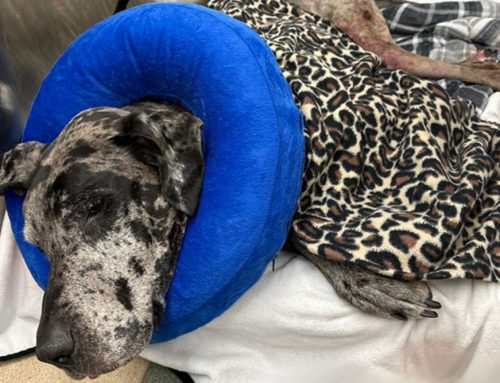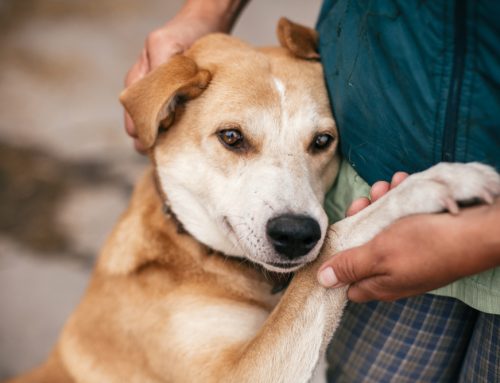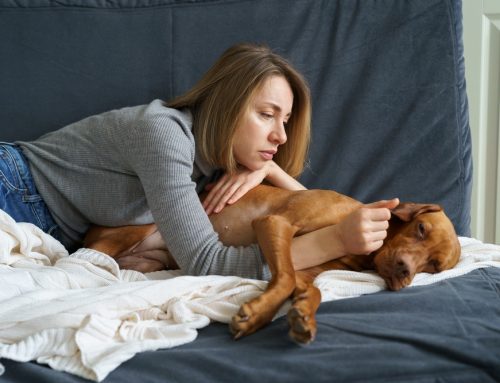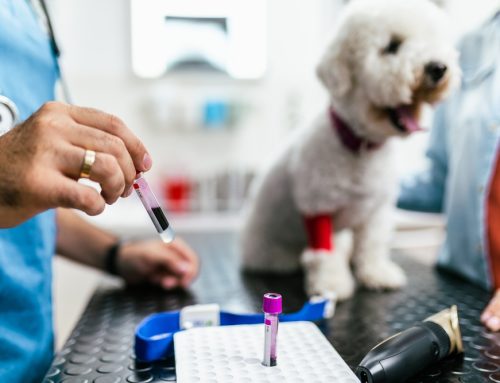July Fourth is a huge summer celebration when people typically gather with friends and family, but the festivities can pose many dangers for your pet. Our Marcy Veterinary Clinic team wants to protect your four-legged friend on this patriotic holiday with our July Fourth pet safety do’s and don’ts.
DO keep your pet indoors
Raucous crowds, screaming children, and blasting fireworks can frighten pets, and they may attempt to flee the scary noises. Keeping them indoors helps prevent them from possibly going missing. Tips to ensure your pet doesn’t get lost on July Fourth include:
- Ensuring doors are secure — If you leave your pet at home, ensure all windows and doors are securely closed and locked.
- Providing a pet safe zone — Create a space for your pet where they can go if they feel overwhelmed by the holiday festivities. This should ideally be an interior room where outdoor noises are muffled. Provide a cozy bed, any resources your pet may need, and a food puzzle toy to help distract them from the change in routine. If you host a July Fourth celebration, and your pet becomes anxious around unfamiliar people, consider confining them to their safe zone during the party. Check on them frequently to ensure they are staying calm.
- Notifying your guests — If you allow your pet to mingle with your guests, they may sneak through an open door when everyone is distracted. Posts reminders on your doors for yourself and your guests to watch for your pet when arriving and leaving.
If you decide to take your pet to a July Fourth party, ensure you keep them leashed and by your side at all times.

DON’T forget to properly identify your pet
Animal control workers report a 30% to 60% increase in lost pets around July Fourth. Pets are sneaky and can get past your defenses no matter how vigilant you are, so ensure your pet is properly identified and they have the best chance of being returned to you should they get lost. Tips include:
- Microchipping your pet — A microchip, which cannot be lost or removed, is the only method that permanently identifies your pet. Our team can easily perform this procedure at your pet’s next wellness exam. Animal shelter workers can scan your pet’s chip, find your contact information, and return your pet safely home where they belong. Once the chip is implanted, you need only to ensure that you keep your contact information in the microchip registry up to date.
- Tagging your pet — In addition to the microchip, your pet should wear a collar with identification tags that are securely attached to the collar and printed with your current, legible contact information.
DO be aware if your pet has a noise phobia
Many pets exhibit a fear response when exposed to loud noises such as fireworks. Signs can be subtle, such as licking their lips, yawning, seeking attention, and hiding, or more severe, such as vocalizing, trying to escape, eliminating inappropriately, and acting aggressively. Noise-phobic pets experience significant anxiety and fear, similar to a panic attack in people, and their condition must be addressed to help prevent emotional and physical trauma. Potential treatment methods include:
- Noise avoidance — Limit your pet’s exposure to the triggering noise, which may not be possible if your neighbors set off fireworks as part of their July Fourth celebrations, or in the case of a nearby thunderstorm, but you can keep your pet away from windows and muffle the noise with music or white noise.
- Behavior modification — Behavior modification works for some pets, but you must start the process weeks or months before July Fourth. This technique involves playing a fireworks sound track at a low enough volume that your pet doesn’t react, and then gradually increasing the volume over numerous sessions. Give your pet high value treats and praise them enthusiastically when they stay calm during the session. If at any point they react anxiously, lower the volume until they are calm, and wait until the next session to attempt to increase the level.
- Supplements — Pheromones and other mood altering supplements can benefit some pets. These products typically work best if administered before the triggering event.
- Medications — In severe cases, pets may require sedation or anti-anxiety medications to help them cope.
DON’T let your pet eat the party food
Any sudden change in your pet’s diet can lead to gastrointestinal (GI) upset, and fatty foods commonly found at July Fourth celebrations can trigger a potentially life-threatening condition called pancreatitis. Many common foods are toxic to pets, including:
- Allium vegetables — Vegetables in the Allium family, including onions, garlic, leeks, shallots, and chives, contain N-propyl disulfide that damages a pet’s red blood cells (RBCs), leading to anemia. Initial signs include vomiting and diarrhea, but once enough RBCs break down, signs include weakness, pale mucous membranes, and blood in the urine.
- Xylitol — Xylitol is an artificial sweetener often used in sugar-free and diabetic-friendly baked goods, but is dangerous for pets because the ingredient can cause severe hypoglycemia. Signs include vomiting, weakness, incoordination, collapse, and seizures.
- Alcohol — Alcohol is served at most July Fourth festivities, but your pet must not imbibe, because they are especially sensitive to its effects. Signs include vomiting, incoordination, collapse, and seizures.
- Grapes — Grapes or raisins are often served to party goers as a healthy alternative, but these treats can cause kidney failure in pets. Signs include lethargy and increased thirst and urination.
DO monitor your pet for overheating
Heatstroke is considered a veterinary emergency, and pets, who do not sweat like humans, are at increased risk. They must cool themselves with less efficient methods, such as panting, which isn’t always sufficient on hot, humid days. Those at greatest risk include senior pets, brachycephalic pets, and overweight pets. Signs include panting excessively, drooling, lethargy, and collapse. If you suspect your pet is overheating, take them to a cool, well ventilated area, offer them water, start the cooling process with lukewarm water, and seek veterinary care as soon as possible.
If your pet has a noise phobia, contact our Marcy Veterinary Hospital team. We can determine if an anti-anxiety supplement or medication can help them better enjoy the July Fourth celebration.








Leave A Comment